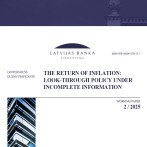Annual inflation continues to drop
The 0.6% month-on-month rise in consumer prices in March 2012 was primarily the result of seasonal factors, oil prices and, in part, the clamour in the food market.
The seasonal impact was pronounced in the prices of the wearing apparel and footwear, which, compared to the February price level still dominated by the impact of sales, were 3.8% higher, as well as in prices of vegetables that rose 9.7% within a month. As a result of a rise in oil prices, fuel also appreciated. Because of the widespread clamour, egg prices rose before Easter, yet they could have a similar impact on the March and April inflation, for the clamour that was pronounced in the neighbouring countries in March, continued in Latvia still in April. The influence of global prices on the monthly food price dynamics was relatively small: according to the FAO data, food prices in March rose 0.2% (1.2% in February).
Within a year, consumer prices in Latvia have risen 3.3%. This figure still includes the electrical power tariffs raised in 2011 and the raise in indirect taxes in the summer of 2011 and for that reason the trend of decreasing annual inflation will be sustained in the coming months. Yet contributors to the annual inflation are also the consumer prices of fuel, thermal energy and natural gas that have gone up in the first months of the year and the overall impact of energy resources on the annual inflation is not abating. The prices of several types of goods had a diminishing influence on the annual inflation: household appliances, furniture, transport vehicles, telephone equipment, audio, video, photo and data processing equipment became cheaper as did some services, e.g., the tuition for various courses as well as higher education. As these consumption groups are not a part of essential goods, the trend in their prices likely reflects the impact of the weak demand.
The current political developments in the Middle East suggest that the supply side pressure on oil prices could remain the case. Albeit the first weeks of April have seen a slight drop in oil prices and the prices of future transactions have also gone down, Iran has enough resources to refrain from exporting oil for even the next two or three years. At the same time it stresses that as it cuts off exports to the United Kingdom, France, and Greece, as well as other EU countries in the near future, it could increase exports to Asia.
It is difficult to estimate the impact of global food prices on the 2012 inflation, as it is too early to evaluate the harvests expected in Europe and North America. The weather conditions in the regions where February and March are the active harvesting season, have not had a devastating impact on the global prices of agricultural products: in places, the harvest has been less than expected based to the areas sown, yet overall it is not considered critical and in some areas a second seasonal harvest is possible.
The demand side pressure on prices is small, as indicated by the drop in sales amounts in retail. The March confidence indicators do not suggest an expected rapid growth in the trade sector. Inflation expectations continue to reflect the reaction to price changes in the goods and services groups which consumers purchase most often (fuel, some food items), yet, as already mentioned, the so-called base effects will continue to have an impact on the diminishing trend of inflation.
Textual error
«… …»






